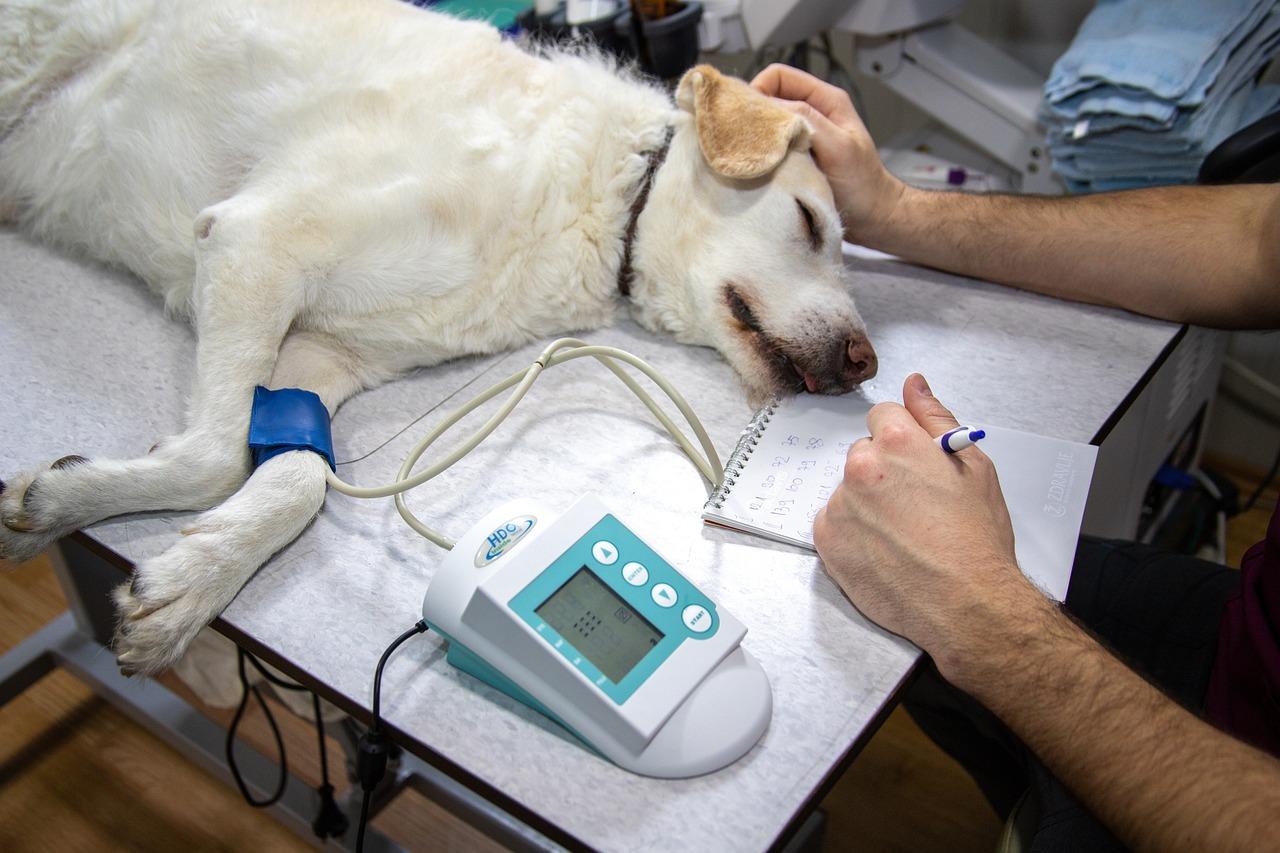My Dog's Heart Is Beating Very Fast



See files for Dogs
If you run around with your dog and pet them on the chest area, it's normal to feel their heart rate is elevated. When a dog has a rapid heart rate while resting, we might have more cause for concern. A dog's heart functions in the same basic way as our own. It will speed up or slow down depending on activity levels, but it is also altered by medication, stress, illness and many other factors. Some dogs are more inclined to have heart rate issues, but determining a dog's susceptibility is not always easy. This is only one of the reasons why veterinarians monitor a dog's heart rate during checkups.
You may wonder why my dog's heart is beating very fast. At AnimalWised, we cannot diagnose the reason for your dog's rapid heart rate, but we can highlight some of the most common causes and treatment options for this symptom.
Reasons a dog has a fast heartbeat
Some dogs will have a naturally higher heart rate than others. This is partly due to hereditary factors, i.e. their genetic inheritance. Heart diseases such as dilated cardiomyopathy in dogs have correlations in human medicine, but the field of study is not as developed in canine medicine[1]. Although we know that genetics are a factor, there is insufficient research to have a clear understanding of the relationship between genes and a fast heart rate in dogs.
You may have heard that smaller dogs have a faster heart rate than larger canines. While there is much anecdotal evidence to support his, the veterinary research is not as clear. Some studies have determined there is a lack of correlation between canine heart rate and body size[2]. This is problematic as a normal heart rate in some dogs can be considered too low or too high if we use size to compare them.
If a dog's heart rate is too fast, it is known clinically as tachycardia. This can be an acute symptom of a disease and will return to normal once they have recovered. It can also be a chronic issue which needs constant management in terms of maintaining a healthy heart rate.
Other studies have found that body size can affect heart rate in dogs, but this is only one factor. Age, breed and disease status are all important factors in a dog's heart rate, but they cannot account for all variations[3]. This means that heart rate alone is not always a good indicator what is the dog's health issue, but it is a good signifier that there is a problem.
There are some normal reasons why a dog's heart is beating fast. These include excitement, exercise and momentary fear. However, when a dog has a rapid heart rate while resting or it is very fast in situations where it should not be, we need to better understand why. For this reason, we find out some of the most common reasons a dog's heart is beating fast in the following sections.
Hereditary heart disease
A dog's genetic inheritance can cause various problems. Selective breeding is used to conform dogs to a certain breed standard which has specific physical traits. This can influence a dog's heart rate in various ways. Their physical structure can influence their health and brachycephalic dog breeds are often more prone to suffering problems such as tachycardia[4].
We cannot use breed alone to determine why a dog's heart rate is beating fast. Although it is a factor, it is not the most important one. Other hereditary issues are not as obvious as brachycephaly. Some dogs may have a genetic predisposition towards heart problems, but they show no obvious signs. It may only be under veterinary examination that a heart problem is detected. Congenital heart diseases are those which occur in utero, with or without a hereditary cause.
Our understanding of hereditary and congenital heart problems in dogs is still limited. Sometimes the problem is due to a defect during initial development. An otherwise healthy looking dog may have a hereditary heart problem such as the following:
- Myxomatous mitral valve disease (MMVD): the most common type of heart disease in dogs, it is caused by degeneration of the mitral valve. This eventually allows blood to flow back into the atrium of the heart and can lead to cardiac arrest.
- Aortic stenosis: narrowing of the aorta which results in interference with the outward blood flow from the heart. This can result in thickening of the heart muscle fibers.
- Patent ductus arteriosus (PDA): a persistent opening of the major blood vessels leaving from the heart. Caused by malformations when the dog is a fetus.
- Persistent right aortic arch: a birth defect in dogs which causes pressure to be placed on the gullet and windpipe. This can result in aspiration and other issues.
- Endocarditis: another congenital heart defect related to the valves which shows a higher heart rate. Caused by an inflammation of the endocardium, i.e. the innermost layer of heart tissue. May also present with a heart murmur in dogs.
These are only some of the hereditary heart problems which can affect dogs. If your dog is suspected of having a congenital heart problem, then your veterinarian will need to carry out various diagnostic tests. These can include x-rays and ultrasounds. Detecting a birth defect or hereditary heart disease early can save your dog's life, so it is important we take puppies to the veterinarian for a primary checkup shortly after they are born.

Acquired heart disease
If your dog does not have a hereditary heart problem, an acquired heart disease may be the reason their heart is beating very fast. These problems are often related to other health issues in the dog. We may only detect the dog's heart rate is high after observing other symptoms. For example, your dog's heart may be beating very fast and they are shaking, but it is the shaking which first indicates there is a problem.
The most common acquired heart diseases in dogs are valvular[5]. They do not always cause a rapid heartbeat in dogs. Some may have a slower heart rate or even an irregular heart rate. Others may cause either high or low heart rates depending on how the dog is affected. Some of the problems may be the same in nature as certain congenital diseases, except their cause is not genetic.
The following are some common acquired hearts diseases in dogs:
- Dilated cardiomyopathy: one of the most common canine heart diseases, it was thought only to be congenital, but recent studies have shown a link to diet in dogs without genetic predisposition[6]. This study highlighted the importance of taurine rich food for dogs, something which can be lacking in commercial dog food.
- Pericardial effusion: the pericardial sac (pericardium) is a sac of tissue which surrounds the heart. This can become affected due to infection, tumors, trauma or idiopathic (unknown) reasons. It causes the pericardium to fill with fluid and put pressure on the heart which can make it beat faster. Treatment will depend on the underlying cause.
- Pericarditis: similar to pericardial effusion, but the pericardium becomes inflamed and not necessary filled with fluid.
- Congestive heart failure: this is not a disease, but a group of symptoms which caused by the heart's inability to properly pump blood through the body. They can be a result of lifestyle and diet, as well as hormonal imbalance, infections or various other issues. The tachycardia is often a result of an enlarged heart, just one of the symptoms of congestive heart failure in dogs.
Many of the acquired causes of a dog's heart beating very fast are a result of other health problems. For example, dogs suffering from obesity often develop heart disease. A dog doesn't have to be overweight for this to happen. Poor quality food and nutrition may include a dog not eating sufficient amounts of taurine in their diet, an amino acid important in maintaining heart health.
Other causes of increased heart rate in dogs
Although heart disease is a common reason why a dog's heart is beating very fast, many other physical and mental health problems can affect the dog's pulse, blood pressure and heart rate. Although they may not affect the heart directly, issues with other bodily systems can affect heart rate. For example, pulmonary disease can affect the dog's respiration which indirectly affects heart rate.
Here are some other health reason's why a dog's heart is beating very fast at rest:
- Pulmonary fibrosis: this is due to the formation of excess fibrous tissue in the dog's lungs. It is the result of various possible causes which can include inherited disorders, inhalation of toxic chemicals or even cancer. Learn more with our article on pulmonary fibrosis in dogs.
- Other respiratory diseases: many other respiratory diseases in dogs can increase their heart rate. These can include bacterial or viral infections. Heart rate should return to normal once recuperated, but any tissue damage caused to the heart may result in chronic tachycardia.
- Sepsis: various types of infection can alter the heartbeat of a dog, but blood poisoning known as sepsis is one of the most dangerous. The infection can result from many routes, but once pathogens enter the bloodstream, they can be sent around the body and cause various systemic problems.
- Toxic shock: if the dog has ingested something they shouldn't, the toxins can send them into shock which may begin with a faster heartbeat. Anaphylactic shock in dogs as a result of allergic reaction can also cause their heart to beat very fast.
- Side effect of medication: different drugs will affect dogs in different ways. One of the most common side effects may be an increased heart rate. The veterinarian will determine whether the increased heart rate is an appropriate risk for a given dog. If not, they will try to provide an alternative treatment. We need to monitor our dogs for any changes if they have been given a prescription of any drug.

Psychological reasons a dog's heart beats very fast
Although pathogenic and inherited causes are often a reason a dog has a rapid heartbeat, we should not rule out psychological distress. We have already said that a dog may have a rapid heart rate when resting due to pathogenic causes. In cases of acute fear or stress, the dog may appear more alert or even become aggressive. Once they are resting, a healthy dog's heart rate should slow back down.
For this reason, we need to look at the context of the increased heart rate. If the dog's heart is beating very fast while shaking and they show signs they are scared, it is likely they are experiencing acute stress. It may be obvious why they are scared. For example, if they are attacked by a larger dog or they have a pre-existing phobia to something.
Unfortunately, many of the causes of stress in dogs are not always easy to determine. Even slight changes in their routine can have an effect on their wellbeing.
Regardless if we think the dog has a physiological or psychological reason why their heart is beating very fast, we should take them to a veterinarian for assessment. They can perform the correct diagnostic tests to confirm the cause and refer us to a canine ethologist if the problem is psychological.

This article is purely informative. AnimalWised does not have the authority to prescribe any veterinary treatment or create a diagnosis. We invite you to take your pet to the veterinarian if they are suffering from any condition or pain.
If you want to read similar articles to My Dog's Heart Is Beating Very Fast, we recommend you visit our Cardiovascular diseases category.
1. Gaar-Humphreys, K. R., et al. (2022). Genetic Basis of Dilated Cardiomyopathy in Dogs and Its Potential as a Bidirectional Model. Animals: an open access journal from MDPI, 12(13), 1679.
https://doi.org/10.3390/ani12131679
2. Ferasin, L., Ferasin, H., & Little, C. J. (2010). Lack of correlation between canine heart rate and body size in veterinary clinical practice. The Journal of small animal practice, 51(8), 412–418.
https://doi.org/10.1111/j.1748-5827.2010.00954.x
3. Hezzell, M. J., Dennis, S. G., Humm, K., Agee, L., & Boswood, A. (2013). Relationships between heart rate and age, bodyweight and breed in 10,849 dogs. The Journal of small animal practice, 54(6), 318–324.
https://doi.org/10.1111/jsap.12079
4. Doxey, S., & Boswood, A. (2004). Differences between breeds of dog in a measure of heart rate variability. The Veterinary record, 154(23), 713–717.
https://doi.org/10.1136/vr.154.23.713
5. Baumgartner, C., & Glaus, T. M. (2004). Erworbene Herzerkrankungen beim Hund: Eine retrospektive Analyse [Acquired cardiac diseases in the dog: a retrospective analysis]. Schweizer Archiv fur Tierheilkunde, 146(9), 423–430.
https://doi.org/10.1024/0036-7281.146.9.423
6. Kaplan, J. L., et al. (2018). Taurine deficiency and dilated cardiomyopathy in golden retrievers fed commercial diets. Pl







